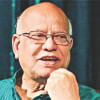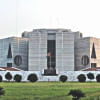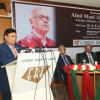I feel ashamed
Finance Minister AMA Muhith is “ashamed” of the fact that bad debts in state-owned banks stand at 27 percent, nearly triple the national average.
The national average of such loan is 10 percent in all the banks combined -- eight state-run and 50 private and foreign commercial banks.
As of June this year, the total national default loan is Tk 74,194 crore, of which Tk 40,100 crore is in the eight state banks -- six commercial and two specialised.
"I feel ashamed," Muhith told a workshop organised by the finance ministry to review the conditions of the state-owned banks (SoBs).
The workshop at the capital's Cirdap auditorium also discussed the authorities' reluctance in pursuing large-scale financial scams involving public banks in recent years.
Muhammad Abdur Razzaque, chairman of the parliamentary committee on the finance ministry, accused the Anti-Corruption Commission of “miserably failing” to bring to book the perpetuators in loan scams involving state-run BASIC Bank.
The ACC failed to take action even though the House committee sent “specific evidence” in this regard to the anti-graft body, he said.
“This is a failure… This causes pain,” he said, adding that what happened in BASIC Bank was “pure robbery in broad daylight”.
Tk 2,900 crore was loaned out to 71 people and the chairman of the bank granted the loans through severe irregularities, he said, referring to BASIC Bank and its then chairman Abdul Hye Bachchu.
ACC representatives were invited to the committee meeting several times, but they avoided the meeting.
"Perhaps they had some limitations," said Razzaque, without elaborating.
Interestingly, some former top officials whose time in the Banking Division witnessed some of the biggest SoB scams in country's history also pointed the finger at the institutional inefficiencies in preventing such scams.
Shafiqur Rahman Patwari, a former Banking Division secretary who now heads the Insurance Development and Regulatory Authority (IDRA), said that Bangladesh Bank remained silent for two years after unearthing the Hall-Mark scam.
The central bank took action only after the finance minister made a phone call and asked it to act, he said.
Hall-Mark was among five private groups that hogged press headlines by taking Tk 4,000 crore loan from Sonali Bank without following due procedures. At that time though, the finance minister had famously said: "Tk 4,000 crore is nothing."
At the workshop, another former Banking Division official Gokul Chand Das said there might be a communication gap between the government and the BB when it came to monitoring the state-run banks.
Each of them thinks that the other will take action, said Gokul, now a member of the IDRA.
Citing the Hall-Mark issue, he said the BB unearthed the scam early in 2010 and informed the government about it only in November.
Two years later, in June 2012, the BB at last swung into action and recommended disbanding the Sonali Bank Board when that Board had only eight days to go.
If the central bank had monitored closely from the beginning this would not have happened. Twenty other banks were involved in the Hall-Mark scam, but no action has been taken against them, he noted.
He suggested that the state-run banks be merged to improve their condition.
Krishi Bank and Rajshahi Krishi Unnayan Bank, the two specialised banks, need to be merged into one bank while Rupali, BASIC and Bangladesh Development Bank into one bank. Janata and Agrani banks have to become one bank, he observed.
Also, if the chief executive officers (CEOs or managing directors) fail to achieve their target, their salary has to be slashed every three months. And if they continue to perform poorly for three quarters in a row, they have to be terminated. This way, the condition of the public banks may be improved, he said.
Bangladesh Bank Governor Fazle Kabir and Deputy Governor SK Sur Chowdhury spoke at the workshop but they did not say anything about the allegations.
SK Sur, however, said merger was no solution to the problems of the state-owned banks.
Bangladesh Institute of Bank Management (BIBM) Director General Toufic Ahmad Choudhury said the state-run banks' governance had to be improved by strengthening the central bank.
No one at the workshop spoke against the Banking Division, but in an independent survey almost everybody will do so, he added.
Improving the condition of the state-run banks requires goodwill and political commitment of the government, he noted.
According to Agrani Bank Chairman Zaid Bakht, appointment of top management people and their extension must be linked with their performance.
The finance ministry makes that decision but the assessment is not done objectively, he noted.
“The top management remains very vulnerable to influence of vested quarters. So when an influential person makes a request, they are in a dilemma as to whether they can refuse it,” he said.
“It is easier said than done, but unless this is done they remain prone to corrupt practices and also vulnerable to outside pressure,” he added.
In his concluding speech, Muhith disagreed with Bakht and said the selection of top management was done fairly.
Earlier, Bakht also said state-run banks had to invest in various development projects of the government. For example, four public banks invested Tk 4,000 crore in Hanif flyover for which the banks were now facing problems.
On the other hand, Agrani Bank granted loans to the BPC and the BJMC, both state-owned agencies, which had been paid through bonds and the interest rate on this bond is lower than the bank's cost of fund. As a result, the bank had to count Tk 1,000 crore in losses, he pointed out.
Alauddin A Majid, the incumbent chairman of BASIC Bank, said that in case of big default loans of state-run banks, 80 to 90 percent responsibility lied with the bank board and the top management. So the government must be cautious while appointing them.
At the opening of the daylong workshop, Banking Division Senior Secretary Yunusur Rahman presented a report on the overall condition of the state-owned banks.

 For all latest news, follow The Daily Star's Google News channel.
For all latest news, follow The Daily Star's Google News channel. 








Comments